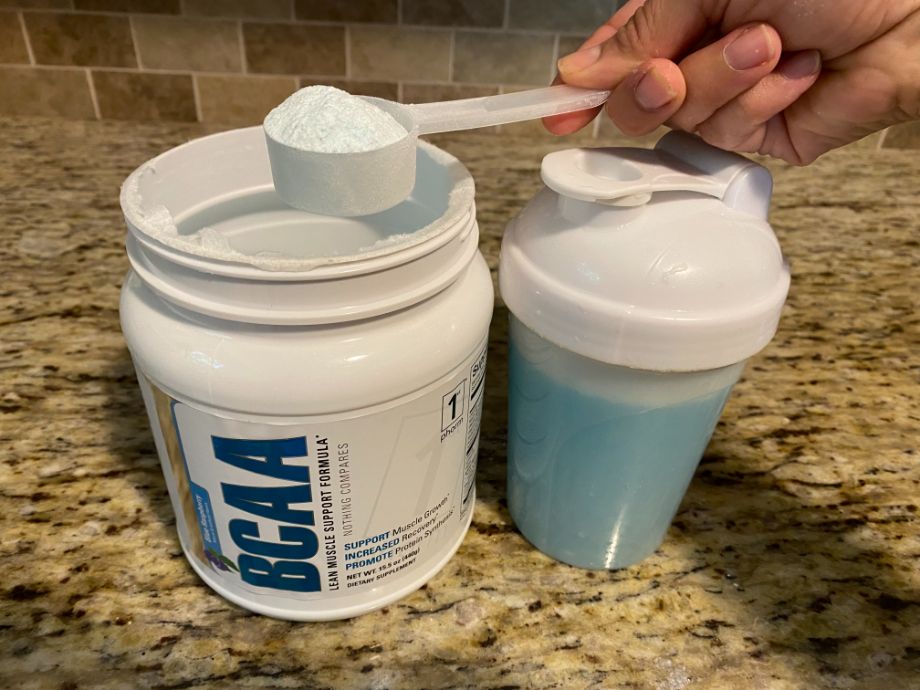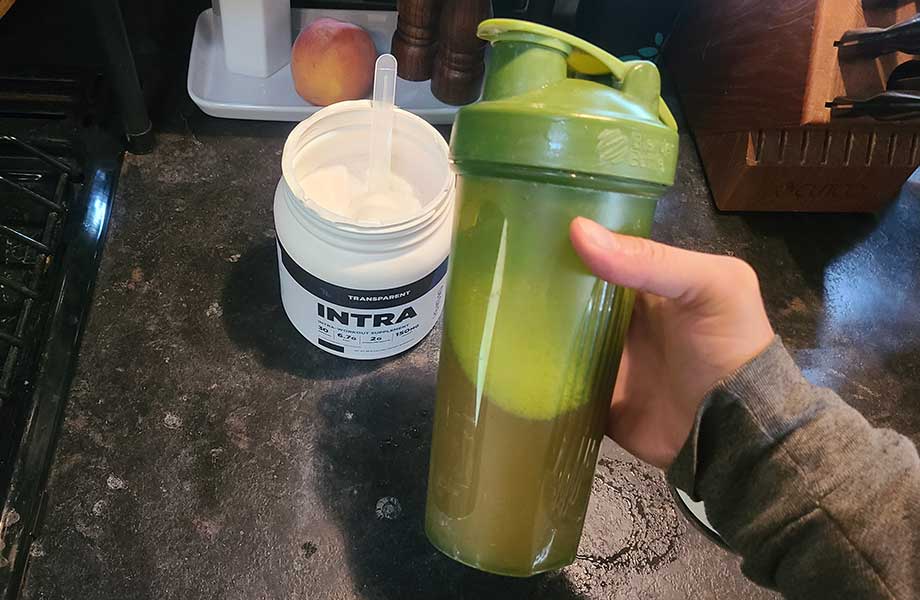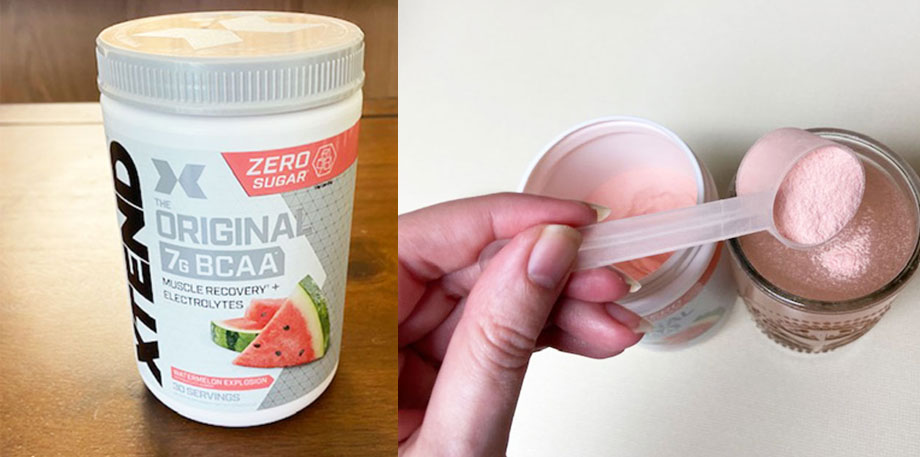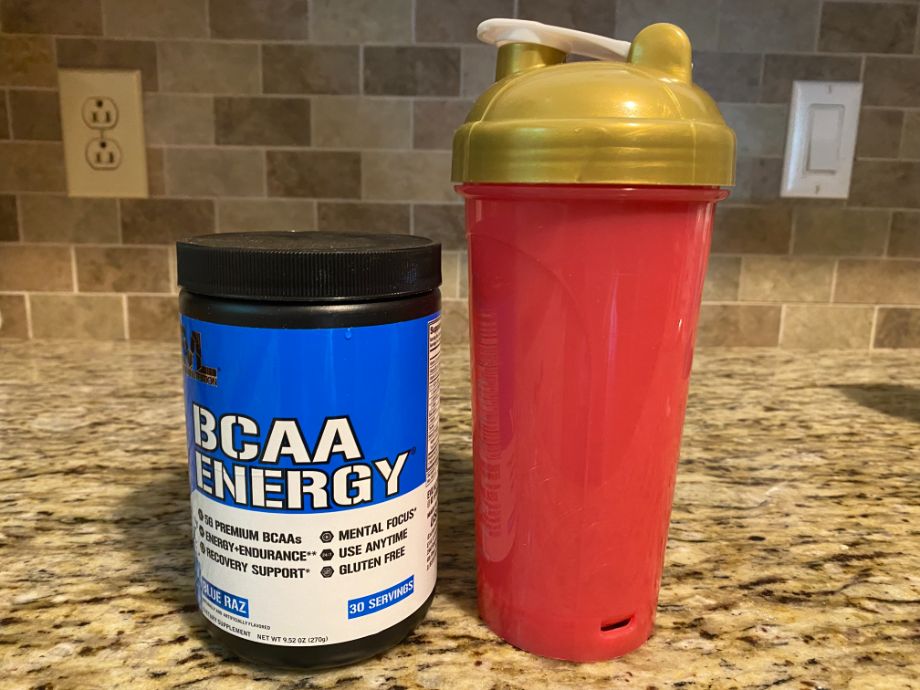We test and review fitness products based on an independent, multi-point methodology. If you use our links to purchase something, we may earn a commission. Read our disclosures.
When you think of branched-chain amino acids (BCAAs), you probably associate them with muscle recovery and growth. It’s true they help activate muscle protein synthesis so you can get swole, but what about other BCAA benefits? One question in particular continues to arise: Do BCAAs give you energy? Let’s explore the relationship between BCAAs and energy to shed light on how these amino acids may fuel more than just muscle gains.
As a registered dietitian nutritionist, I’ll provide an overview of BCAAs, including their benefits, their impact on energy levels, and whether BCAA supplements might be a valuable addition to your health and fitness regimen.
Medical disclaimer: This article is intended for educational and informational purposes only. It is not intended as a substitute for medical advice. For health advice, contact a licensed healthcare provider.
What Are Branched Chain Amino Acids?
When you consume protein, it undergoes digestion, breaking down into individual amino acids (the building blocks of protein), each serving specific roles within the body. BCAAs represent three of the nine essential amino acids that must be acquired through dietary sources, such as through food or supplements, since the body cannot synthesize them on its own.

RELATED: EAA vs BCAA
The BCAAs—leucine, isoleucine, and valine—derive their name from the shape of their chemical structure. They are heavily involved in protein synthesis and may promote muscle recovery, aid in fat loss, reduce muscle protein breakdown, and enhance athletic performance. Leucine, in particular, activates a signaling pathway known as mTOR, which plays an important role in muscle protein synthesis, impacting muscle growth and strength.
Standard food sources rich in high-quality protein like fish, eggs, meat, poultry, and soy are good sources of BCAAs and can help you achieve muscle growth when combined with resistance training.
RELATED: High-Protein Foods
Do BCAAs Boost Energy?
Amino acids do not directly create cellular energy, known as ATP, in the same way as glucose from carbohydrates. However, amino acids are involved in energy metabolism and can contribute to ATP production indirectly.
During physical activity, particularly endurance sports, the body’s glycogen stores may be depleted. Glycogen, the stored form of glucose, steps in to fuel muscles when blood glucose levels dip.
When glycogen is low, BCAAs come into play. They undergo conversion1 into intermediates that enter pathways generating ATP (adenosine triphosphate), cellular energy utilized for both physical activities and daily tasks. It’s important to note that the energy-prolonging effects of BCAAs may be more noticeable in situations of extended or intense exercise rather than short or low-intensity activities.
Furthermore, some research2 suggests that BCAAs reduce the amount of tryptophan that enters your brain because tryptophan and BCAAs compete for the same transport system to cross the blood-brain barrier. The body uses tryptophan to create serotonin, a neurotransmitter that may contribute to exercise fatigue.
When less tryptophan is available to make serotonin, you could feel a prolonged sense of energy related to increased time to fatigue. However, these results are controversial, and ongoing research is needed.

Do BCAA Supplements Actually Work?
If you already consume a well-balanced diet that includes sufficient amounts of protein, the additional benefits of BCAA supplementation may be limited. In this case, you’re consuming enough BCAAs through the foods you eat, and your body will likely excrete what it doesn’t need.
However, if you struggle to eat enough protein through a balanced diet, you may benefit from adding a high-quality protein powder, creatine with BCAAs, or a BCAA supplement to your routine. Keep in mind that most studies showcasing the benefits of BCAAs have been done on people who regularly engage in resistance or endurance training. For BCAA supplementation to actually work, consistent training is key.
RELATED: BCAA vs Creatine
Research-Supported Benefits of BCAAs
Are BCAAs worth it? Let’s see what the research says. Here are several evidence-backed benefits of BCAAs.
Increases Muscle Growth
As mentioned previously, the BCAA leucine activates muscle protein synthesis, necessary for building muscle mass.
In one study3, 10 resistance-trained men ingested either 5.6 grams of BCAAs or a placebo drink immediately post-training. Muscle protein synthesis was found to be 22% higher in the BCAA group compared to the placebo group. This indicates that the ingestion of BCAAs alone increased the stimulation of muscle protein synthesis following resistance exercise.
Even so, research indicates that muscle protein synthesis increases more when BCAAs are taken along with the other essential amino acids. In fact, one study4 involving 48 individuals found that taking 20 or 40 grams of whey protein containing all essential amino acids increased muscle protein synthesis by 49% to 56% percent, respectively.

Reduces Muscle Soreness
Researchers from The Journal of Sports Medicine and Physical Fitness5 found that long-distance runners who consumed BCAAs following intense training reported 12% less muscle soreness and fatigue compared to those who took a placebo. Indicators of muscle damage and inflammation were also lower in the BCAA trial.
The findings suggest that BCAA supplementation during intensive training may decrease muscle soreness and fatigue, potentially due to the attenuation of muscle damage and inflammation.
Delays Exercise Fatigue
A 2020 study6, including 16 long-distance male runners who took BCAAs before an incremental treadmill exercise experienced delayed exercise fatigue compared to the placebo group.
Results showed that serotonin levels were lower in the BCAA trial, which may explain why fatigue was delayed. The time to exhaustion was longer in the BCAA trial, suggesting that BCAA intake may increase endurance, possibly by reducing serotonin concentration.
Supports Fat Loss
In a 19-day study7, competitive wrestlers following a high-protein, calorie-restricted diet with BCAA supplementation lost 3.5 more pounds than those provided with a soy protein supplement. Additionally, the BCAA group showed a 0.6% greater reduction in body fat compared to the soy protein group, even though both groups consumed similar calories daily.
RELATED: High-Protein Foods for Weight-Loss
Another study8, involving 17 male athletes in their 20s, found that those who underwent resistance training and supplemented with BCAAs successfully retained lean muscle mass while also reducing fat mass. In contrast, the placebo group, which consumed a carbohydrate drink in conjunction with resistance training, experienced both fat and muscle loss.
Enhances Recovery
A systematic review and meta-analysis9 assessed the effectiveness of BCAA supplementation in reducing delayed-onset muscle soreness (DOMS). The analysis included 10 randomized clinical trials, with seven studies indicating that BCAAs could reduce DOMS between 24 to 72 hours post-exercise.
While variability in training status, doses, and timing make it challenging to establish definitive conclusions, the research suggests that BCAA supplementation is considered beneficial for improving muscle recovery by reducing DOMS in trained subjects with post workout-induced muscle damage.

RELATED: Best Muscle Recovery Supplements
Potential Side Effects of BCAAs
BCAAs are generally considered safe when consumed in appropriate amounts. It’s important to follow the recommended dosage instructions on the product label. Even so, those with certain medical conditions or who are taking specific medications should exercise caution when taking athletic supplements.
Individuals with liver or kidney disease may need to avoid BCAA supplements. BCAA products may increase toxic waste products in the blood and increase the workload on these impaired organs. Additionally, medications for diabetes and neurological disorders may lead to potentially dangerous interactions.
Those with pre-existing medical conditions and prescribed medications should consult their healthcare provider before starting any new supplement.
Do BCAAs Give You Energy: FAQs
Do BCAAs help with fatigue?
Yes, some research suggests that BCAAs result in increased time to muscle fatigue. BCAAs could help you exercise longer and have a more effective workout before your muscles start to tire.
Do BCAAs give you energy before a workout?
No, unlike caffeine in the best pre-workouts, BCAAs don’t boost energy prior to a workout. However, BCAAs play a role in extending energy during prolonged exercise by contributing to the creation of ATP.
What happens when you take BCAAs every day?
It’s generally considered safe to take branched-chain amino acids daily in the recommended amounts. Do not exceed the serving size on the product label. Taking BCAAs every day may support muscle building and recovery and could help you exercise longer before muscle fatigue.
These statements have not been evaluated by the Food and Drug Administration. This product is not intended to diagnose, treat, cure, or prevent any diseases.
References
- Platell, C., Kong, S.-E., McCauley, R. and Hall, J.C. (2000), Branched-chain amino acids. Journal of Gastroenterology and Hepatology, 15: 706-717. https://doi.org/10.1046/j.1440-1746.2000.02205.x
- Cordeiro LMS, Rabelo PCR, Moraes MM, et al. Physical exercise-induced fatigue: the role of serotonergic and dopaminergic systems. Braz J Med Biol Res. 2017;50(12):e6432. Published 2017 Oct 19. doi:10.1590/1414-431X20176432
- Jackman SR, Witard OC, Philp A, Wallis GA, Baar K, Tipton KD. Branched-Chain Amino Acid Ingestion Stimulates Muscle Myofibrillar Protein Synthesis following Resistance Exercise in Humans. Front Physiol. 2017;8:390. Published 2017 Jun 7. doi:10.3389/fphys.2017.00390
- Witard OC, Jackman SR, Breen L, Smith K, Selby A, Tipton KD. Myofibrillar muscle protein synthesis rates subsequent to a meal in response to increasing doses of whey protein at rest and after resistance exercise. Am J Clin Nutr. 2014;99(1):86-95. doi:10.3945/ajcn.112.055517
- Matsumoto K, Koba T, Hamada K, Sakurai M, Higuchi T, Miyata H. Branched-chain amino acid supplementation attenuates muscle soreness, muscle damage and inflammation during an intensive training program. J Sports Med Phys Fitness. 2009;49(4):424-431.
- AbuMoh’d MF, Matalqah L, Al-Abdulla Z. Effects of Oral Branched-Chain Amino Acids (BCAAs) Intake on Muscular and Central Fatigue During an Incremental Exercise. J Hum Kinet. 2020;72:69-78. Published 2020 Mar 31. doi:10.2478/hukin-2019-0099
- Mourier A, Bigard AX, de Kerviler E, Roger B, Legrand H, Guezennec CY. Combined effects of caloric restriction and branched-chain amino acid supplementation on body composition and exercise performance in elite wrestlers. Int J Sports Med. 1997;18(1):47-55. doi:10.1055/s-2007-972594
- Dudgeon WD, Kelley EP, Scheett TP. In a single-blind, matched group design: branched-chain amino acid supplementation and resistance training maintains lean body mass during a caloric restricted diet. J Int Soc Sports Nutr. 2016;13:1. Published 2016 Jan 5. doi:10.1186/s12970-015-0112-9
- Weber MG, Dias SS, de Angelis TR, et al. The use of BCAA to decrease delayed-onset muscle soreness after a single bout of exercise: a systematic review and meta-analysis. Amino Acids. 2021;53(11):1663-1678. doi:10.1007/s00726-021-03089-2
Further reading

Different pre-workouts have varying uses. Here’s a breakdown of each type of preworkout and who it’s best for. Read more

Our KURU MOMENT review takes a deep dive into a pair of shoes designed for recovery and foot pain relief. Read more

The Grizzly Wide is exactly like it sounds—roomy and wide. See our complete thoughts on this affordable, oversized tub in our Desert Cold Plunge Tub review. Read more

After months of testing, we present the best low-sugar protein bars for satisfying cravings with a punch of protein. Read more

